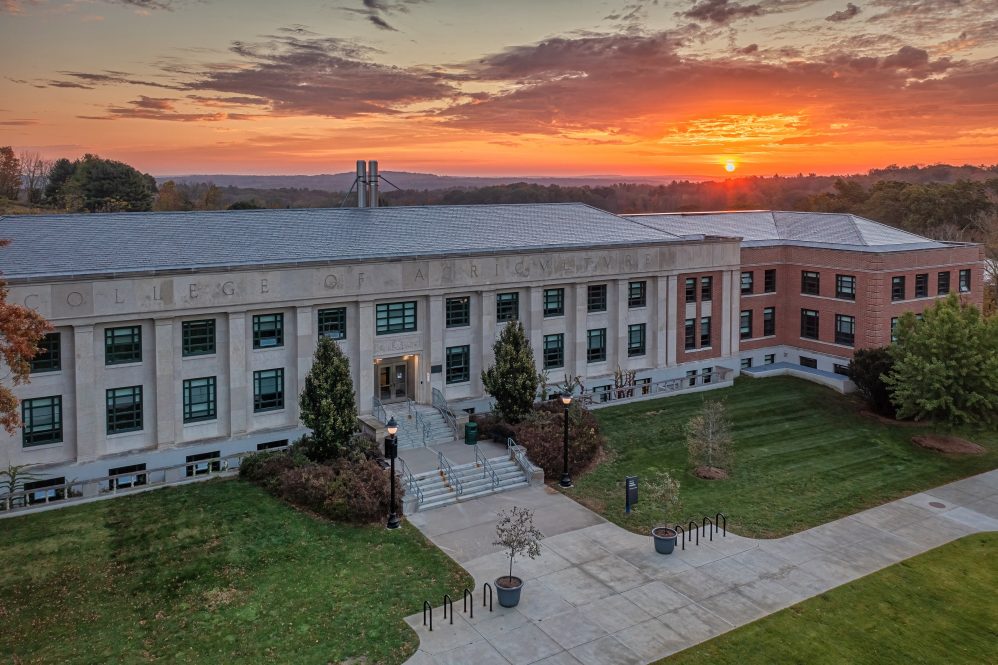The College of Agriculture, Health and Natural Resources (CAHNR) has established formal collaboration agreements with two universities in India.
CAHNR Dean Indrajeet Chaubey and Kumar Venkitanarayanan, associate dean of research and graduate education and professor of animal science, signed agreements (MOUs) with the Rajiv Gandhi Institute of Veterinary Education and Research (RIVER), Dayalbagh Educational Institute, and the Indian Institute of Technology, Roorkee (IIT Roorkee) earlier this year. Discussions for establishing an MOU with a third Indian University, Kerala Veterinary and Animal Sciences University, Pookode, Kerala are underway. The MOUs will be in place for five years.
“The benefits are going to be many,” Chaubey says. “One of the benefits is working on issues that go beyond just Connecticut in scope, so these agreements allow us to make progress on issues that are truly global in scope.”
CAHNR faculty had preexisting relationships with RIVER and IIT Roorkee. Venkitanarayanan has worked with graduate students from RIVER for years and one of Chaubey’s former graduate students is currently a professor and department chair at IIT Roorkee. The MOU with KVASU, Venkitanarayanan’s alma mater, will be a renewal of an agreement started a decade ago.
“Given the similarity of interests and research areas at IIT Roorkee versus what much our faculty are doing, and given the high-profile nature of IIT Roorkee, it made a lot of sense for us to solidify that partnership,” Chaubey says.
“We have a long history of collaboration and recruiting students from this institution (RIVER),” Venkitanarayanan says. “Their students are high-quality, high-caliber students. So, that’s why we keep collaborating with them.”
Through these agreements, faculty and graduate students will have the opportunity to tackle global problems, like how climate change and water access impact their fields, with expertise from two continents.
“We provide opportunities for our faculty from both sides to identify challenging problems or issues on which we have expertise,” Chaubey says. “Faculty [can] come together and work in an interdisciplinary, trans-boundary setting to apply the knowledge to address those issues.”
Through the new MOUs, the Indian universities will send some of their students to rotate in animal science and pathobiology and veterinary science labs at UConn. The first group of students will arrive in May and spend four to six weeks on campus, with financial support from their originating institutions.
Participating students will have the opportunity to gain hands-on experience in research fields in which UConn faculty are experts including microbiology, food safety, stem cell technology, meat science, animal nutrition, reproductive physiology, animal genetics, veterinary medical diagnostics, and vaccine science.
CAHNR could send students to veterinary medicine schools in the Indian universities where they will be able to work directly on animal cases, including wild animals, a unique opportunity that animal science students don’t currently have at UConn.
The MOUs further enables the establishment of a study abroad program for undergraduate students. Chaubey says they hope to begin this summer program in 2025.
“It’s always one of the most enriching experiences students may have because it gives them an opportunity to see how societies, communities, and the world work. They can see differences in terms of how problems are approached and how people think about solving them,” Chaubey says.
The MOUs also provide the groundwork for a program in which early career faculty can spend three months at another institution, fostering international collaborations.
Venkitanarayanan says this effort will help increase CAHNR and UConn’s international profile as a top-tier research institution.
“We have been very intentional in enhancing our partnerships with international institutions,” Venkitanarayanan says. “The overarching goal is to gain international recognition and visibility as well as benefit our students with international experience.”
This work relates to CAHNR’s Strategic Vision area focused on Ensuring a Vibrant and Sustainable Agricultural Industry and Food Supply.
Follow UConn CAHNR on social media



